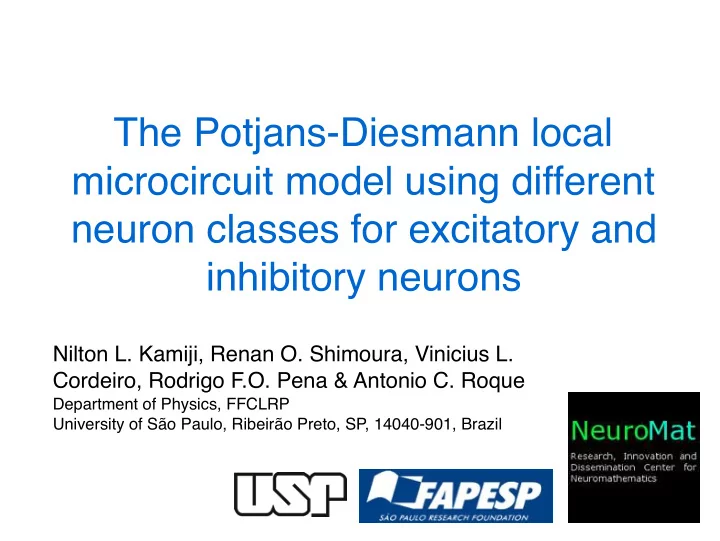

The Potjans-Diesmann local microcircuit model using different neuron classes for excitatory and inhibitory neurons Nilton L. Kamiji, Renan O. Shimoura, Vinicius L. Cordeiro, Rodrigo F.O. Pena & Antonio C. Roque Department of Physics, FFCLRP University of São Paulo, Ribeirão Preto, SP, 14040-901, Brazil
http://chronopause.com/
In some species, cells with similar receptive fields and functional properties are grouped to form local microcircuits – cortical columns http://chronopause.com/
Examples of response properties in cortical neurons (Izhikevich, 2004)
Study the behaviour of the Potjans-Diesmann cortical microcircuit (Potjans and Diesmann, 2014) based on different classes of neurons models (excitatory and inhibitory) ~ 80.000 neurons ● (80% excitatory, 20% inhibitory) ~ 10 9 synapses ● Same LIF (leaky integrate-and-fire) ● model for both excitatory and inhibitory neurons (iaf_psc_exp model in NEST) Inhibitory synapse weight is 4 times ● greater than excitatory synapses Poissonian/DC/Thalamic input ● Realistic model in terms of neural ● connectivity
Study the behaviour of the Potjans-Diesmann cortical microcircuit (Potjans and Diesmann, 2014) based on different classes of neurons models (excitatory and inhibitory) Izhikevich and AdEx neuron models Izhikevich (2007) AdEx FS (fast spiking) cNA (continuous non-adapting) inhibitory neurons inhibitory neurons c RS (regular spiking) u RS (regular spiking) c r excitatory neurons r u e excitatory neurons r n r e t n ( t p A ( Regular spiking p Regular spiking ) A ) c u r r e ~ 80.000 neurons n ● t ( p (80% excitatory, 20% inhibitory) A Fast spiking Continuous non-adapting ) ~ 10 9 synapses ● Same LIF (leaky integrate-and-fire) ● model for both excitatory and inhibitory neurons (iaf_psc_exp model in NEST) Inhibitory synapse weight is 4 times ● c u r greater than excitatory synapses r e n t Poissonian/DC/Thalamic input ● ( p time (ms) A time (ms) Realistic model in terms of neural ● ) connectivity
Study the behaviour of the Potjans-Diesmann cortical microcircuit (Potjans and Diesmann, 2014) based on different classes of neurons models (excitatory and inhibitory) Izhikevich and AdEx neuron models Izhikevich (2007) AdEx FS (fast spiking) cNA (continuous non-adapting) inhibitory neurons inhibitory neurons c RS (regular spiking) u RS (regular spiking) c r excitatory neurons r u e excitatory neurons r n r e t n ( t p A ( Regular spiking p Regular spiking ) And of course, it’s corresponding A ) Galves-Locherbach stochastic neuron model c u r r e ~ 80.000 neurons n ● t ( p (80% excitatory, 20% inhibitory) A Fast spiking Continuous non-adapting ) ~ 10 9 synapses ● Same LIF (leaky integrate-and-fire) ● model for both excitatory and inhibitory neurons (iaf_psc_exp model in NEST) Inhibitory synapse weight is 4 times ● c u r greater than excitatory synapses r e n t Poissonian/DC/Thalamic input ● ( p time (ms) A time (ms) Realistic model in terms of neural ● ) connectivity
PD microcircuit model with LIF neurons (original configuration) Properties: 1) asynchronous and irregular 2) excitatory layers show lower firing rates; 3) layer 6e with extremely lower firing rate compared to 6i
PD microcircuit model with Izhikevich RS and FS neurons in NEST (FULL scale raster plots) Excitatory synaptic weight (w) was adjusted to display similar response properties to the same poissonian input The synchrony as well as the overall firing rate was much higher
Modified PD microcircuit model LIF neurons replaced by GL Izhikevich RS neurons Spike traces and firing rates were qualitatively reproduced - Higher firing rate compared to original LIF version Higher firing rate was obtained
Recommend
More recommend